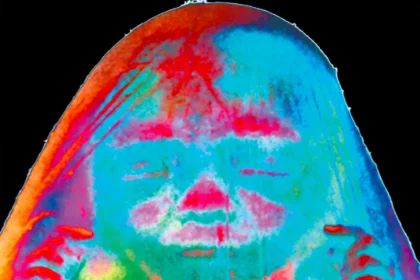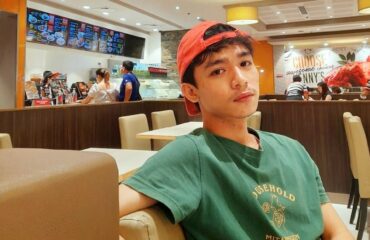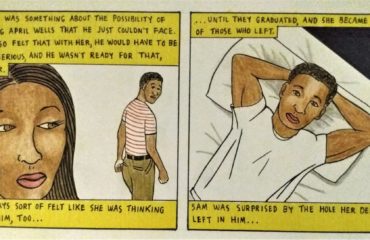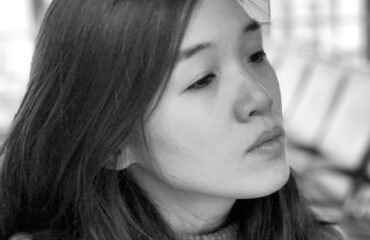
Edward Salem is a poet who hasn’t lost his sense of humor. “Palestinians,” he shares in our interview, “are insanely funny.” It’s this sense of humor that jumps off the page of Salem’s debut poetry collection, Monk Fruit, surprising readers, even as he’s tackling topics like the occupation of Palestine, American imperialism, torture, and genocide. Salem will take you to Gaza—but you’re going to stop by the tchotchke bin at Burlington Coat Factory on the way. Described by its publisher, Nightboat Books, as “like Rumi on acid,” Monk Fruit speaks to the immediacy of our current moment while also taking a 250,000-year lens to humanity, inviting readers to interrogate their place in it all—even, perhaps, without losing optimism entirely.
Edward Salem is interviewed by E Ce Miller.
FWR: Monk fruit doesn’t actually appear in any of the poems in Monk Fruit. For those not familiar, monk fruits are these trellised, blossoming squash, native to East Asia, named for having been grown in monastery gardens for thousands of years; now they are more widely known as a trendy weight loss hack/artificial sweetener substitute. Am I reaching too hard for a metaphor here? What were you hoping to evoke with the title of the collection?
ES: Thank you for bringing in this context. There’s definitely something to that, the play of high and low, like Buddha on a coaster. And I like how playful it sounds, “monk fruit,” and how slippery the associations can become when you read the book through the lens of the title—I think it manages to hold a lot of different motifs together: children, spirituality, sexuality, corporeality. Poems as fruit of the psyche. It can also serve as a metareflection on myself as a poet dabbling in eastern philosophy, but in this way that is kind of impish or outré.
FWR: There are so many flying insects in this collection. Some are trapped, before facing violent, untimely ends: crushed, clapped to death. Bees are military drones, hornets are “cancer picked from [a] mother’s lungs.” A few seem to offer a touch of whimsy, like the flea who is stunned by a fluffy sweater. What’s up with all the flying insects?
ES: I just saw the new Superman movie, and there’s a scene where Superman flies to save a squirrel from a falling building, acknowledging the sanctity of its life. It’s fun to imagine how busy Superman would be if his mandate included insects.
FWR: The poem “Buddha’s Bad Meal”, which describes a bee trapped in a juice glass, reminded me of this Buddhist koan about a dragonfly caught in a spider’s web, which essentially asks whether an observer should intervene and free the dragonfly. The most earnest students, I think, incline toward freeing the dragonfly. But what of the spider’s hunger?
The narrator in your poem says, “It wouldn’t matter if I rescued the bee or let it drown.” There’s this question many of the poems in Monk Fruit seem to be asking: Does it really matter what we do to each other, and if it does matter, on what scale? Can you speak to this?
ES: I love this question, thank you. And thanks for sharing the koan. It reminds me of an inspiration for the poem, a scene from Luis Buñuel’s film Viridiana. A man sees an exhausted dog tied to a moving cart, being dragged along the road. Out of compassion, he buys the dog from the cart driver to save it from this cruel treatment. But immediately after this act of mercy, another cart passes by, dragging another dog behind it.
Years ago, when I was living in Beirut, before I had really contended with Buddhism and Vedanta, a friend suggested detachment as the only adequate response to the cruelty of the occupation of Palestine. He was speaking to this notion that engaging, in and of itself, perpetuates injustice. That only through stillness and detachment can one move anything. I can’t tell you how appalled I was by his stance, as if we should lie down while our people are tortured and killed. But, as it goes with certain Eastern spiritual traditions, it’s only through direct experience that you start to understand a perspective that first seemed so cold. I think now that my friend was trying to say—how did Ram Dass put it? Police create hippies and hippies create police.
Back to the question of scale, I remember in the early days of starting City of Asylum/Detroit, we were meeting with a possible investor and he was like, so how many exiled writers will you bring over every year? He was expecting the answer to be like 100 or at least 10. When we explained how complicated the visa process alone would be, and that our mission was to provide deep, multi-year support to one fellow at a time, he was deflated. And I get it. At this moment, we’re supporting two Palestinians from Gaza through our new fellowship in exile (largely buoyed by the boundless optimism and energy of my cofounder, Laura Kraftowitz).
At the same time, compared to the number of Palestinians experiencing genocide, helping two people feels like a drop in the bucket. I live in the contradiction that exists between my philosophical pessimism, exemplified by the drowning bee or the abused dog, and the life-affirming hope inherent to providing these fellowships.
FWR: “Give What You Can” is a poem I read over and over—the way it is written invites readers into this sort of breathless repetition. It made me self-aware of how I relate to the media I consume. The poem mimics scrolling through social media, putting language to the image-heavy sensory excess most of us have grown accustomed to. I wonder about the effects of, for example, viewing footage of ICE raids in the same 1:1 framed feed as a best friend’s new baby photos, of considering an image of an infant starving in Gaza immediately before a celebrity’s ad for green laundry detergent—it’s all sort of occupying the same brain space, all landing in the same frequency in the sympathetic nervous system…
A few poems later, we get “The Palestinian Chair”, with the line “…you realize that / You were there. / For all of it. / It was all you.” These two poems struck me as a sort of call and response. Technology facilitates a sense of “being there” for everything while also fostering a kind of dissociation from all of it. Do you have thoughts on this?
ES: I recently watched a clip—on social media, of course—where Arundhati Roy talked about how unnatural it is for us to take in all of this information. How we can’t hold it and shouldn’t expose ourselves to it all, how she thinks it’s making us spiritually sick. And I agree with that. But in a time of live-streamed genocide, you have to reconcile that with the moral failure of not looking, or rather, looking away from the images that Palestinians in Gaza are asking us to witness. This poem sort of documents the dizzying experience of watching a nightmare unfold, and also watching the direct action and creativity harnessed to resist it.
I almost hate to say it, but I think a collection of poetry is often sequenced to give the reader a parallel sort of whiplash. You don’t want a stretch of poems to blur into one another, so you keep the reader on their toes through juxtaposition, tone shifts, etc., in a way that somewhat resembles the deliberate scramble of the algorithm. But the key differential is that poetry sensitizes where the algo desensitizes. Poetry is kind of the anti-social media.
FWR: For all the intensity in this collection, there are lines and images that I also found funny, if wry. The poem “Tchotchke” features a chrome Ganesh bought from the clearance bin at Burlington Coat Factory. “Fasting for Gaza” includes the line “Jenny Craig should advertise with Al Jazeera.” What do you think irony has to say to reverence, levity to gravity? Will we be telling jokes at the end of the world?
ES: The book is dedicated to my late father, to whom I owe my fucked up sense of humor. He was deeply disgruntled, disdainful of what Zionism and American imperialism were doing to his country and its neighbors, and at the same time, he was hilarious. After dinner, he’d stand up and announce to the family that he was going to the bathroom “to pray,” and when he emerged, he’d stand in front of us and make the sign of the cross, pronouncing Latin-sounding gibberish, “dominos patros bibiscos,” cracking himself up every time.
Palestinians are insanely funny. It’s something that gets lost when we’re fighting for survival in a genocide, but gallows humor is intrinsic to our culture. Yasmin Zaher is hilarious, Adnan Barq is hilarious, Mohammed El-Kurd is hilarious, Randa Jarrar is hilarious. My sisters are hilarious. We’re a funny fucking people, but there’s a pressure on us to be earnest victims, to one-dimensionalize ourselves. I’m just trying to be myself—and I’m my father’s son—by making room in this book for the full expression of that.
FWR: In “L’Origine du Monde”, you write, “Surprise myself every time I begin / a new poem without Palestine, // though nothing is my other obsession,”. The omission of “I” before “surprise” made me wonder if these lines were a command or (and?) an expression of surprise on the narrator’s part.
When did you begin writing Monk Fruit? Could you discuss the process of writing this collection? How do you experience writing poetry, which is perhaps the antithesis of the “hot take” in the face of… [gestures at the world].
ES: I love this question, and your interpretation of the omission of “I” as a command. Can I say yes? I think the truth is more that I have a habit of starting poems with “I,” and on a purely intuitive level it felt right to lop it off. In writing Monk Fruit, I trusted my intuition, even and maybe especially when something felt like it might be wrong or risky or too demented in some way. I wrote it concurrently with a second book, Intifadas, out this spring, which is more grounded. I mean, it’s still demented, but with Monk Fruit, I really followed that energy to work out my obsessions and excavate the weird, profane images living in me, without holding the reins too tightly on how they show up on the page.
FWR: Does your work with City of Asylum/Detroit inform your poetry, and vice versa?
ES: Naji al-Ali, the Palestinian political cartoonist who created Handala and who was assassinated because of his art, was one of my first and primary artistic heroes, especially in my formative years as an artist. Geoffrey Rush’s portrayal of the Marquis de Sade’s imprisonment in the film Quills also left a deep impression on me. His anguish, his defiance, how he fell apart, and how he smuggled his manuscript out—not unlike the Palestinian prisoner Wisam Rafeedie’s The Trinity of Fundamentals.
In another life, I was an artist. When I lived for a while in Ramallah, my family was always worried because I was making provocative performance art in public spaces. Of course, in Ramallah, the Palestinian Authority was the one to worry about, since they were the enforcers of Israel’s efforts to quell dissent. They arrested me once. Even for innocuous gestures, like a performance where I threw pillows over the Apartheid Wall, I had to have lookouts watching my back. But now I live in the US, and there is, at least for now, still a level of safety.
A friend from Mexico recently described living in the US as hiding behind a bully for protection. And my work at City of Asylum reminds me not to take that position lightly.
FWR: I want to end by asking if you have an answer to the question “Barbecue” posed:
“250,000 years after / the discovery of fire, / we still ate raw meat. / But good things come
to those who wait. // It took us a quarter / of a million years / to arrive at barbecue, / so give God a little / more time.”
Those of us who don’t have a quarter of a million years, which is to say all of us, how might we better fill our waiting? Or, perhaps, that is the wrong question—maybe it is in the constant, desperate filling that we are getting ourselves and each other in trouble? What do you think?
ES: At the risk of sounding like an optimist, I’m not sure we’ll have to wait that long. Demis Hassabis, the child prodigy who now runs DeepMind and who has spent his life researching artificial intelligence, puts our chances of creating AGI [Artificial General Intelligence] by 2030 at 50%. Other researchers and thinkers I’ve long followed in this space are similarly optimistic. Hassabis won a Nobel prize for his work using AI to fold proteins, which will likely be involved if we’re ever able to cure cancer. I wonder about a super-intelligent entity that could eradicate social illnesses like Zionism and capitalism while heralding in universal abundance. I do worry that the technology is coming faster than we can prepare for it, but I’m also trying to hold a bit of hope for the vast good it could do.
I really hate to say it, but no form of resistance so far—neither violent, nonviolent, nor symbolic, certainly not poetry or speaking out on social media—none of it has stopped the ever-escalating genocide in Gaza. I’m not saying we should stop resisting, just the opposite. But I do wonder, and I’m the first to admit this does sound fantastical and maybe a little escapist, but if we merged with AI, could there be a paradigm shift toward empathy and compassion? I know it’s de rigueur to believe the opposite, that the techno-feudalists are tightening their grip as we move deeper into fascism. But nothing else is working the way we need it to. Despite our best efforts, we’re still failing the people in Gaza, Sudan, Yemen, Afghanistan, Haiti, to say nothing of the eighty billion land animals we murder annually for food. Whatever the case, it seems likely that humans will evolve by merging with AI and technology. Monk Fruit deals a lot with the Big Bang, the origin of the universe and the nature of reality. I love thinking of the distant past, and the far future.


